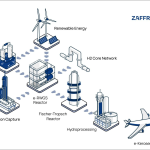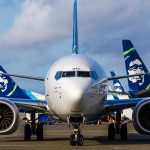US startup regional operator Connect Airlines has announced plans to introduce up to 100 hydrogen-powered ATR 72-600 turboprop aircraft from 2025, once regulatory approval is secured for a new modular fuelling system developed by Universal Hydrogen. The airline, which is aiming to become the world’s first zero-emission carrier, expects to start services this year between the downtown Billy Bishop Airport in Toronto, Canada, and the US hubs of Chicago O’Hare and Philadelphia, initially using a fleet of conventionally-powered Q400 turboprop aircraft, before transitioning to green hydrogen-powered ATRs. Connect, a brand of Boston-based Waltzing Matilda Aviation, sees a resurgence in demand for turboprop aircraft in the US as major operators withdraw uneconomic regional jets from loss-making secondary markets. Through a partnership which includes modest investment by each company in the other, Universal will develop technology through which canisters of hydrogen fuel are loaded directly onto aircraft, requiring no fixed infrastructure at airports, and Connect will introduce the concept into commercial service, reports Tony Harrington.
Connect Airlines CEO John Thomas reported the company was now in the final stages of securing US regulatory approvals for its initial Canada-US flights, and would start with two Q400s formerly operated by UK airline FlyBe, adding up to five more of the type by the end of 2022, and flying up to 30 by the end of 2023. He said these aircraft, which produced 40% lower emissions than comparable-sized regional jets on short haul routes, would be used to build network scale until Universal’s hydrogen propulsion systems were certificated, enabling the carrier to transition to retrofitted ATR 72 aircraft, as well as the Q400s.
In a strong and early vote of confidence in the Universal Hydrogen system, Connect has announced firm orders to convert 75 ATRs and purchase rights for another 25 ATR conversion packages, which involve not only the installation of new hydrogen fuel systems but also reconfiguration of aircraft cabins and structures to provide space at the rear of the fuselage for hydrogen canisters, relocation of the passenger entry door and the installation of a large access door for loading the fuel capsules. While specific aircraft have not yet been identified for conversion and will not be acquired until the Universal kits are certificated for use, the airline has been assured by aircraft lessors that there will be abundant used ATR 72s available for conversion by 2025.
“We are building Connect Airlines from the ground up as a smarter, more sustainable travel option for North American travellers,” said Thomas, a former CEO of Virgin Australia Airlines, head of the aviation practice of global consultancy LEK, and current board member of Icelandair and Canadian corporate aviation group SkyService. “We have committed to being the world’s first true zero-emission airline and the only way to accomplish this in the near term is with hydrogen. We see the partnership with Universal Hydrogen as the fastest path to zero-emission operation because they offer both an affordable retrofit solution for the existing airplane fleet as well as a pragmatic approach to delivering hydrogen to any airport in our route network.”
Prior to the pandemic, said Thomas, around 165 million passenger journeys were undertaken each year on US air routes of less than 400 nautical miles (740 kilometres), emitting some 17 billion pounds (7.7m tonnes) of CO2. “If, over a period of time, all of those passengers were flying on zero emission aircraft, they would eliminate those emissions, or around 10% of the emissions total of the US aviation industry,” he said, adding that liquid hydrogen had higher density than conventional jet fuel, was more efficient and was suitable as a power source for regional aircraft, although not yet for larger narrowbody and widebody jets.
Connect has estimated that within five years, approximately 600 regional passenger jets operating in the US will be due for retirement, creating significant new opportunities for replacement with sustainably-powered turboprop aircraft, and potentially providing Connect with as much as 15-20% of that market as it expands its network across the US, in partnership with larger legacy carriers.
Paul Eremenko, the co-founder and CEO of Universal Hydrogen, said: “This order places Connect firmly in the vanguard of the march to get aviation on a path to meeting Paris Agreement emissions targets. This will very soon need to turn into a sprint if the industry has any hope of decarbonising in time without having to curtail the growth in passenger volumes. We will need to convert most of the regional fleet in the 2020s and ensure that the new narrowbody aircraft built in the 2030s are hydrogen-powered. There is no other way to get there.”
Image: ATR 72-600 in Connect Airlines livery












More News & Features
New initiative formed to accelerate SAF adoption and production in the Pacific Northwest
Airfreight giants DHL Express and FedEx announce big US SAF deals
New Zealand initiatives announced on electric aircraft, hydrogen refuelling and carbon removals
EU states to mobilise 500 million euro support for early-mover eSAF production startups
LanzaJet produces first next generation, ethanol-based SAF at flagship Freedom Pines refinery
European Commission announces Sustainable Transport Investment Plan to advance low-and-no-carbon fuels